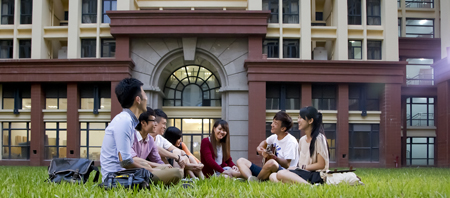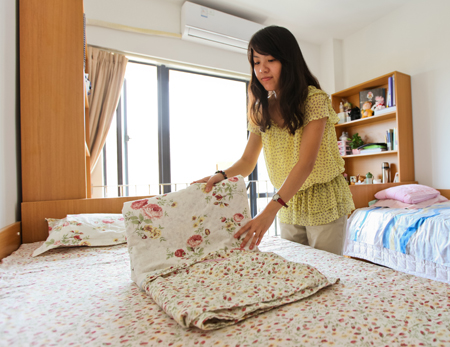Thoughtful Arrangements
There are washing machines in every residential building and closets in every room, and on each floor of every building there are rooms for students to hang washed clothes. All pantries are equipped with essential appliances like microwave ovens, refrigerators, and drinking fountains. Due to the lack of permanent restaurants at this stage, the university has arranged a temporary takeaway restaurant and has set up vending machines at different locations for the students’ convenience. A service centre selling food and grocery items has also been put into use. At the entrance of each building there is a security guard to ensure safety. The rooms are large, brand-new, complete with all the essential living facilities, and have wired internet connection (with a wifi zone on the ground floor). As for transport, shuttle bus service between the current campus and the new campus is available, with nighttime service operating until the next morning.
A “Five-Star Home”
For first-year undergraduate Yu Liheng, who had to share a room with seven other students when he was in middle school, the new campus is nothing less than a “five-star home”. Although he admits that currently dining on the new campus is not very convenient and the internet speed could be faster, he still thinks the beginning of this new chapter in his life is beautiful. “There are many activities every day. In fact I just watched a basketball match this morning which was organised by our residential college,” he says excitedly. “And unlike living on campus when I was in middle school, here the boundaries between different classes become blurred, which is a good thing, because when I was in middle school, I didn’t know the other students very well until after three years of living together, but here in less than a month I’ve already made a lot of new friends.” And as for the shuttle bus service which some students have complained about not being frequent enough, Yu says it doesn’t bother him. “I think it’s okay,” he says. “I would leave a little early to make allowances for the possible delay, which actually I haven’t experienced so far. As for the wait in the bus, I think it’s reasonable to wait a bit for more passengers to leave.”
Overall, students who are now living on the new campus describe the living conditions as satisfactory and the living arrangements as thoughtful. Many of them have offered suggestions for further improvement, which mainly revolve around the quality and prices of the foods, the lack of extractor fans in the pantries, and the lack of stops at the current library and the “killer slope” for government-operated bus service.



